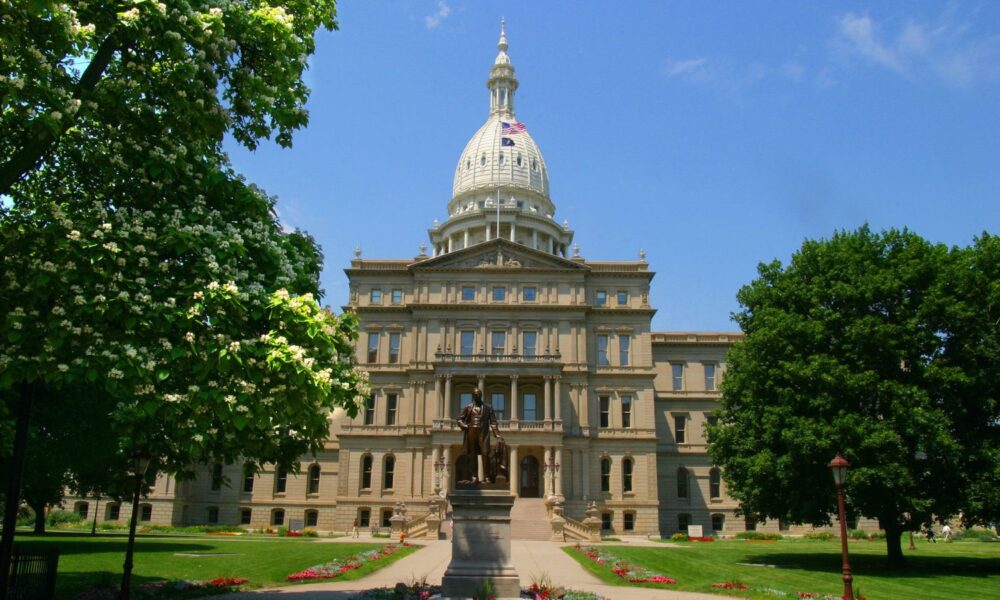It’s Danger Season right now for climate impacts around the United States and the world. While we confront extreme heat, wildfires, and intense storms, crucial work to reduce global warming pollution and mitigate the worst effects of climate change continues.
One notable example is in Michigan, where utilities are phasing out coal plants and momentum is building for legislation that would support an equitable clean energy transition.
Landmark DTE Energy settlement
In July, the Michigan Public Service Commission (MPSC) approved a momentous settlement agreement regarding the electric utility DTE Energy’s plan to provide electricity to its 2.3 million customers for the next 20 years. Some of the most notable provisions of the settlement include:
- Advancing retirement of DTE’s massive Monroe coal-fired power plant, with half of it shutting down in 2028 and the other half in 2032;
- Adding nearly 3,800 megawatts of renewable energy by 2030 on top of what DTE originally proposed; and
- An agreement by DTE to allocate $38 million to organizations and programs designed to provide bill payment assistance and energy upgrades for income-qualified families, including $8 million for low-income communities to implement programs for solar, batteries, and energy efficiency.
The DTE settlement came about following extensive stakeholder testimony and public engagement led by community organizations Soulardarity and We Want Green, Too. The Union of Concerned Scientists (UCS) intervened in the case with the Ecology Center, Environmental Law & Policy Center, and Vote Solar, focusing our testimony on energy justice, community solar and energy storage, and equitable grid transition issues. In addition, more than 200 of our supporters submitted comments to the MPSC urging it to strengthen DTE’s plan.
In 2022, the MPSC similarly approved a revised version of utility Consumers Energy’s long-range energy plan following settlement negotiations. Consumers Energy will close its remaining coal-fired power plants by 2025 and add 8,000 megawatts of solar by 2040.
Michigan’s clean energy future agenda
Taken together, the resolution of the DTE and Consumers Energy resource plans represents a solid foundation for a clean economy powered by renewable energy. But it’s only the beginning for what’s needed for Michigan to chart a course toward a 100-percent clean and equitable future.
With new Democratic majorities in the Michigan Legislature, lawmakers are considering several clean energy and climate bills, and the momentum is building. The Great Lakes State has the opportunity to join other leading states in the region, notably Minnesota and Illinois, by adopting comprehensive updates to phase out fossil fuel electricity plants and ensure that the benefits of a clean energy transition flow to all communities.
We are currently tracking key bills and policies that would:
- Establish a standard for electric utilities to achieve 100-percent, carbon-free electricity by 2035. The proposed standard includes provisions requiring utilities to source sizable amounts of their renewable electricity from customer-owned rooftop solar and other smaller-scale, distributed solar facilities that renters or others without suitable roof space can subscribe to (known as “community solar”). Half or more of the projects in these categories would be reserved for low-income households, helping communities pursue their vision of locally owned, clean power that keeps more wealth circulating in their neighborhoods.
- Direct the MPSC to consider public health, affordability, equity, and climate change when reviewing utility plans. Empowering the commission to focus on factors at the intersection of the energy system, climate science, racial injustice, and cost burdens would, in turn, require utilities to provide plans that protect the health, safety, and financial wellbeing of traditionally disadvantaged communities.
- Expand energy savings and energy efficiency programs. Known in Michigan as “energy waste reduction,” efficiency measures help lower utility bills because the cleanest and least expensive energy is the energy we don’t use. Requiring electric and gas utilities to prioritize efficiency programs for low-income communities would help account for historical underinvestment and ensure that benefits flow to those who need them most.
- Address the energy burden and affordability crisis. Low-income Michigan households face a double whammy of paying a high percentage of their income on utility bills and suffering more frequent and longer power outages due to underinvestment in local power grids. The Legislature should enact policies that cap individual utility bills if household income is below a certain level and increase the amount of compensation available to low-income customers who suffer outages.
- Reform utility political contribution and lobbying regulations. The Michigan Environmental Justice Coalition and other advocates are calling on the Legislature to ban investor-owned utilities from using ratepayer dollars for political contributions and enact other lobbying-related ethics reforms to ensure monopoly companies do not continue to block efforts to establish a cleaner, more affordable energy system.
What’s next?
As Michigan lawmakers work to advance key priorities, Gov. Gretchen Whitmer’s administration is pursuing federal funds and grant programs made available through the landmark Inflation Reduction Act and bipartisan infrastructure law. The state is currently seeking input and stakeholder engagement on leveraging these opportunities to implement the 2022 MI Healthy Climate Plan, a roadmap to achieve economywide carbon neutrality by 2050.
So, yes, it has been a hot summer for clean energy in Michigan. This progress gives us hope amidst a steady stream of devastating climate impacts around the globe that governments at all levels, along with utilities and private industry, can work together to reduce heat-trapping emissions and unlock the vast economic and health benefits of a clean economy future.
Michiganders must keep the pressure on state legislators to seize the opportunity before them. On September 26, join the MI Clean Energy Future Day of Action at the Michigan state capitol, which will feature a rally, a festival, and direct engagement with lawmakers. Michigan residents also can send a message to legislators asking them to support a clean and equitable energy future by clicking here.

